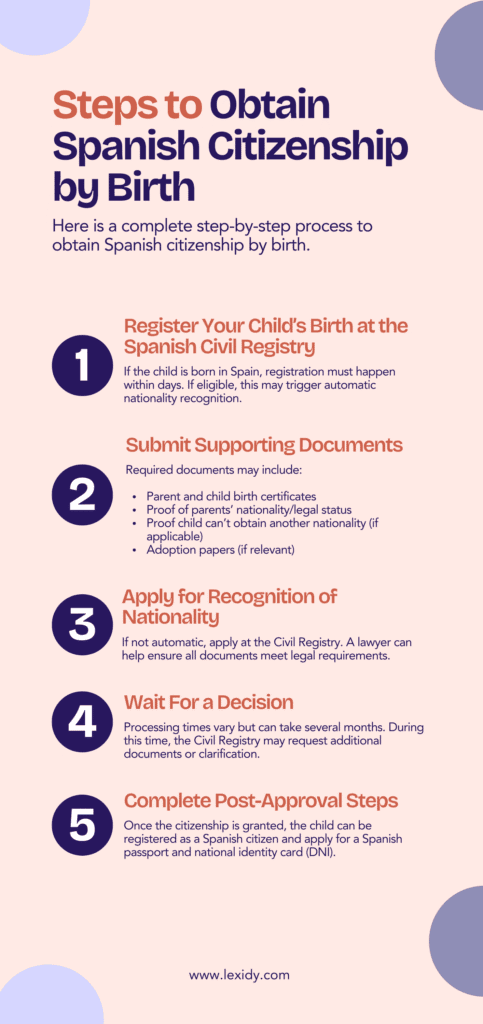If your child is born in Spain, will they automatically become Spanish? It’s one of the first questions international families ask, and the answer might surprise you. Spanish citizenship by birth isn’t guaranteed simply because a baby is born on Spanish soil. Instead, it depends on specific legal criteria tied to the parents’ nationality and status in Spain.
Spanish nationality law is based on the legal principle of “ius sanguinis” — citizenship passed down by blood, rather than “ius soli”, which grants citizenship based on birthplace. That means most children born in Spain will only qualify for Spanish citizenship if specific conditions are met.
In this article, our immigration team explains how Spanish nationality by origin (or nacionalidad española de origen) works, who qualifies for citizenship by birth or descent, and how to apply.
(Article Updated June 2025)
Table of Contents
- What Is Spanish Citizenship by Birth?
- Is a Child Born in Spain Automatically a Spanish Citizen?
- Understanding Ius Sanguinis vs. Ius Soli
- Who Qualifies for Spanish Citizenship by Origin or Birth?
- How to Apply for Spanish Citizenship by Birth
- Benefits of Gaining Spanish Citizenship by Birth for Your Child
- Dual Nationality: What You Need to Know
- How Our Lawyers Can Help You Apply for Spanish Citizenship by Birth
What Is Spanish Citizenship by Birth?

Spanish citizenship by birth is a legal status granted to certain children at the time of their birth under specific conditions set by Spanish law. It is not automatically given to every child born on Spanish soil, but rather to those who meet clearly defined legal criteria.
In Spanish law, this status is formally known as “nacionalidad española de origen”, or Spanish nationality by origin. It gives the child the same rights as someone born to Spanish parents, including the right to a Spanish passport, the ability to live and work anywhere in the EU, and access to Spain’s public services and education system.
One of the most important aspects of this type of citizenship is that it’s considered by origin, which means it can often be passed down to future generations, including children and even grandchildren, under certain conditions. This makes it one of the most enduring and impactful forms of Spanish nationality.
Whether a child qualifies depends on several factors, particularly the nationality and legal status of the parents at the time of the child’s birth.
Is a Child Born in Spain Automatically a Spanish Citizen?
This is one of the most common questions from international families, and the answer is no, not always.
Being born in Spain does not automatically make a child a Spanish citizen. Spanish nationality law does not follow the ius soli principle (citizenship by place of birth) in most cases. Instead, eligibility depends on the parents’ nationality and legal status at the time of birth.
Legal updates in 2018 clarified these rules but didn’t necessarily make them easier to navigate. That’s why many families still need to apply for Spanish citizenship by birth through a formal legal process.
Citizenship requirements can change — learn how we ensure your application for Spanish nationality by origin is fully compliant.
Understanding Ius Sanguinis vs. Ius Soli
To understand how Spanish citizenship by birth works, it helps to look at the two main legal principles countries use to determine nationality:
- Ius sanguinis means “right of blood”. A child’s citizenship is based on the nationality of their parents, not the place they are born. Spain follows this model.
- Ius soli means “right of the soil”. A child automatically receives citizenship from the country where they are born, regardless of the parents’ nationality. This is common in countries like the United States or Canada.
Spain’s nationality law is built around jus sanguinis, but there are exceptions. In certain cases, a child born in Spain to foreign parents may still qualify for Spanish nationality if specific conditions are met. These exceptions are covered in the next section.
Who Qualifies for Spanish Citizenship by Origin or Birth?
Spanish law defines specific cases where a child can obtain Spanish citizenship by origin or birth (nacionalidad española de origen), even if neither parent is Spanish.
A child may qualify in the following situations:
- They are born to at least one Spanish parent, no matter where the child is born. This is the most direct path.
- They are born in Spain to foreign parents, and at least one of those parents was also born in Spain, unless the parent was a diplomat or consular officer.
- They are born in Spain to stateless parents. In this case, the parents must prove that the child cannot acquire citizenship from any other country.
- They are born in Spain to foreign parents whose home country does not recognize nationality for children born abroad. If this would leave the child stateless, Spanish nationality may be granted.
- They are born in Spain and their origins cannot be determined. This applies to abandoned children and foundlings with unknown parentage.
- They are adopted by a Spanish citizen. Minors are granted citizenship immediately. Adults adopted by a Spanish citizen can apply for citizenship within two years of the adoption.
Additional Path for Children Born in Spain to Foreign Parents
Spanish law also offers a privileged and express route for minors born in Spain to foreign parents. If the child resides legally in Spain with their parent(s) for at least one uninterrupted year, they may apply for Spanish citizenship while still a minor. This route would not initially be considered citizenship by origin, but it offers a faster and more favorable path than standard naturalization.
Real-Life Examples
- A child is born in Spain to Venezuelan parents. If Venezuelan law does not automatically grant nationality to children born abroad, the child could be left stateless. In this case, Spanish citizenship may be granted to avoid that outcome.
- A newborn is found abandoned in a public place in Spain, and the identity of the parents cannot be established. The child would be presumed Spanish unless proven otherwise.
- A non-Spanish couple legally adopts a child and one of the adoptive parents later becomes a Spanish citizen. If the child is still a minor at the time of the adoption, they will automatically acquire Spanish nationality.
Not sure if you qualify for Spanish citizenship by birth? See what’s required and how we support your application.
How to Apply for Spanish Citizenship by Birth

If your child qualifies for Spanish citizenship by origin or birth, the next step is to begin the legal application process. Although the requirements can vary slightly depending on the case, here’s how the process typically works:
1. Register the child’s birth at the Spanish Civil Registry
If the child is born in Spain, this must be done within the first few days after birth. If the child qualifies for citizenship by birth, this step may initiate the nationality recognition process automatically.
2. Submit supporting documents
Depending on the pathway, this may include:
- Proof of the parents’ nationality and legal status
- Birth certificates of the parents and child
- Evidence that the child cannot acquire another nationality (if applicable)
- Adoption paperwork (for adopted children)
3. Apply for recognition of nationality
If the case is not automatic, you must formally apply for Spanish citizenship by birth at the Civil Registry. A lawyer can assist in preparing the documentation to ensure it meets all legal standards.
4. Wait for a decision
Processing times vary but can take several months. During this time, the Civil Registry may request additional documents or clarification.
5. Complete post-approval steps
Once the citizenship is granted, the child can be registered as a Spanish citizen and apply for a Spanish passport and national identity card (DNI).
Additional Notes
Minors are exempt from Spain’s language and cultural knowledge tests required in other citizenship applications.
If the child is born in Spain to foreign parents, it’s important to check the timeline for applying. In some cases, missing key deadlines may require the child to wait until later in life to apply.
Benefits of Gaining Spanish Citizenship by Birth for Your Child

Obtaining Spanish citizenship by birth offers lasting advantages that go far beyond legal status. It provides your child with freedom, access, and protection across Spain and the European Union.
Spanish Passport and EU Citizenship
Your child will receive a Spanish passport and become a citizen of the European Union. This allows them to live, work, and travel freely in all EU and Schengen Area countries without visas or special permits.
Permanent Right to Reside in Spain
With Spanish citizenship, your child will not need to renew residency permits or apply for visas. They have a guaranteed legal right to remain in Spain for life.
Access to Public Healthcare and Education
Spanish citizens benefit from Spain’s public healthcare system and free or low-cost public education. This includes access to top-quality medical care and schools from early childhood through university.
Protection from Spanish Embassies Abroad
If your child travels or lives abroad, they can receive help and protection from Spanish consulates in most countries. This can be crucial in emergencies or legal situations overseas.
Simplified Family Reunification
Spanish citizenship may help streamline future immigration procedures for close family members, such as siblings or parents, who may wish to join the child in Spain.
Dual Nationality: What You Need to Know
Spain generally does not allow dual nationality unless the person is from a country that has a specific agreement with Spain. In most other situations, individuals must renounce their original citizenship to acquire Spanish nationality.
When Dual Nationality Is Allowed
Spain allows dual nationality only with the following:
- Ibero-American countries
- Portugal
- Andorra
- Equatorial Guinea
- The Philippines
If your child holds the nationality of one of these countries, they may be able to keep it while also holding Spanish citizenship by birth.
Why This Matters
If your child’s original nationality is from a country not on this list, they may be required to give it up when acquiring Spanish citizenship. Also, some countries automatically revoke citizenship when a second nationality is acquired.
Understanding both Spain’s rules and your home country’s position on dual nationality is key.
Want to explore this topic further? Read our full guide on Dual Citizenship in Spain.
How Our Lawyers Can Help You Apply for Spanish Citizenship by Birth

Applying for Spanish citizenship by birth can be straightforward in theory, but in practice, it often involves legal nuances, documentation challenges, and uncertainty around timing or eligibility.
Our bilingual legal team specializes in Spanish nationality law and supports families from all over the world. Whether you’re registering a child born in Spain or navigating more complex situations like statelessness or adoption, we’ll guide you through each step.
We’ll help you:
- Confirm eligibility based on your specific case
- Prepare and submit the right documents to the Civil Registry
- Clarify how dual nationality may apply to your situation
- Ensure deadlines and legal requirements are met
Ready to Get Started?
Whether you’re ready to apply for Spanish citizenship by birth or still exploring your options, our team of immigration lawyers in Spain are here to help. Fill out the form below to get your free consultation!

